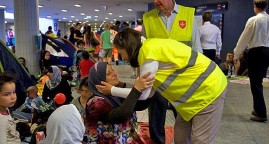Back to the Chain Gang
Article published on the Carnegie Middle East Center website on 07/08/2019 by Maha Yahya
Lebanon is increasingly mistreating its Syrian refugees, even sending some home to face a terrible fate.
In the past few months, Lebanese institutions have intensified coercive actions designed to drive Syrian refugees—of whom 986,942 are registered with the United Nations High Commissioner for Refugees—out of the country. It has initiated a campaign against their being hired, engaged in mass evictions, and implemented forced deportations. Mobs have attacked refugees, while former members of the Ahrar al-Sham opposition group have been put on trial for fighting against the Syrian army. The moves are based on a premise that Syria is stable and secure for a refugee return. This is utterly false.
The refugees’ most prominent antagonist is Foreign Minister Gebran Bassil, the son in law of Lebanese President Michel Aoun and leader of the Free Patriotic Movement. Consistently, Bassil has blamed the refugees for all of Lebanon’s ills and its economic pain—from the zero percent growth rate to unemployment. In this way he has introduced a sense of urgency into the idea of return as a means of resolving Lebanon’s growing troubles. Bassil has gone so far as to accuse the international community and nongovernmental organizations of conspiring to keep the refugees in Lebanon, in spite of what he claims are suitable conditions in “peaceful” Syria for their return. However, he has ignored reports that returnees have faced mistreatment and worse in Syria—from forced conscription to incarceration to death.
Bassil, who has presidential ambitions, has used the refugee issue to present himself as a defender of Christian rights against the Sunni majority that a permanent resettlement of the Syrians would bring with it. However, while Bassil has led the charge, other Lebanese politicians or groups have also worried about the impact of the refugees on Lebanon’s sectarian balance, actively or quietly asserting claims similar to his. Last year, Hezbollah announced that it would work with the Syrian government to encourage a refugee return.
This attitude has encouraged recurrent racism against the refugees, which might prove difficult to reverse if it is not countered soon. The most menacing repercussions are emerging forms of collective punishment against Syrians. An example of this occurred, notably, on October 13, 2017, when residents of Miziara, a village in northern Lebanon, attacked refugees following the murder of a young woman by a Syrian who was not a refugee. This forced them all to flee the town, although only one Syrian had been involved in the crime.
Only a few weeks ago, mass expulsions also took place in a refugee camp in Deir al-Ahmar in the northern Beqaa Valley. Following a scuffle between refugees and firefighters after three refugee tents had been burned by vigilantes, local officials issued an eviction order obliging 400 Syrians to move elsewhere.
On July 1, 20 shelters in ‘Arsal were demolished by the Lebanese army. In another incident last June, 55,000 refugees were forced to dismantle their shelters in ‘Arsal. According to Save the Children, this left 5,000 families and around 15,000 children without a home.
These evictions are also taking on religious and national overtones. In the absence of a centrally led refugee policy and against a backdrop of increasingly acrimonious public rhetoric, municipalities that had been at the forefront of caring for refugees are taking action. As of 2016, thirteen municipalities have evicted over 3,600 Syrians, while another 42,000 remain at risk of eviction.
The situation has become more alarming since the shift in Beirut after the 2018 elections, when a majority sympathetic to President Bashar al-Assad entered parliament for the first time since 2005. This majority is using the question of return to push for normalization with the Syrian regime, a matter on which there is no consensus in Lebanon. Presenting refugees as a threat to national security broadens Lebanese public support for normalization.
Meanwhile, there is also a divergence of interests between the Syrian regime and its Lebanese allies. While the allies are keen on normalizing with Damascus, they don’t want the regime to block a refugee return indefinitely as a way of maintaining leverage over Lebanon and the international community. For Hezbollah and its partners, the open-ended presence of a large underclass of mainly Sunni refugees, many of them resentful of Hezbollah’s involvement in the Syrian conflict, is not something the party can tolerate.
For many refugees, a return to Syria can be life-threatening. The risk of arbitrary arrest is high. The German Foreign Ministry published a report last December that, rightly, highlighted that no place in Syria was completely safe. The findings showed that males between the ages of eighteen and 42 who returned home had to serve in the military or could be imprisoned for “abandoning their country.”
In November last year, Mo‘in al-Mer‘ebi, a former Lebanese minister of state for the displaced, confirmed that more than 20 refugees who had returned to Syria were killed, while others had enlisted in the army or been kidnapped. In spite of this, deportation from Lebanon remains a constant threat. In April, the Lebanese authorities deported at least sixteen Syrians through Beirut airport. According to Human Rights Watch, they had to sign “voluntary” repatriation forms, although they were terrified of being persecuted in Syria.
Lebanon is not a signatory to the 1951 Refugee Convention or its 1967 Protocol. However, it is bound to respect the principle of non-refoulement—the practice of not forcibly returning refugees to a country where they might face persecution. The international community, particularly the European Union, can use its economic leverage over Lebanon to address this issue. It can try to persuade the Lebanese government to respect the rights of Syrian refugees before the current atmosphere of hatred reaches an irreversible point, threatening future relations between the neighboring communities.
It was not so long ago that Lebanon went through a devastating war of its own and its population faced the trauma of displacement and exile. It would help for many Lebanese to recall their own past, as they make the life of vulnerable Syrian refugees even more miserable than it already is, while sowing the seeds of future conflict.
Related Articles
“We still have not seen anything on migration push”
02/01/2016. Deciphering the workings of the current phenomenon and future waves of immigration that Europe will face in the coming years.
Climate refugees: eternal “forgotten Law People”?
11/30/2015. Hundreds of millions of people are likely to leave their land due to the environmental problems.
ICMPD around the Globe: Contribution to the SHADE MED Forum 2-2017
11/24/2017. Michael Spindelegger delivered a keynote speech at the fifth Shared Awareness and De-confliction in the Mediterranean Forum.






